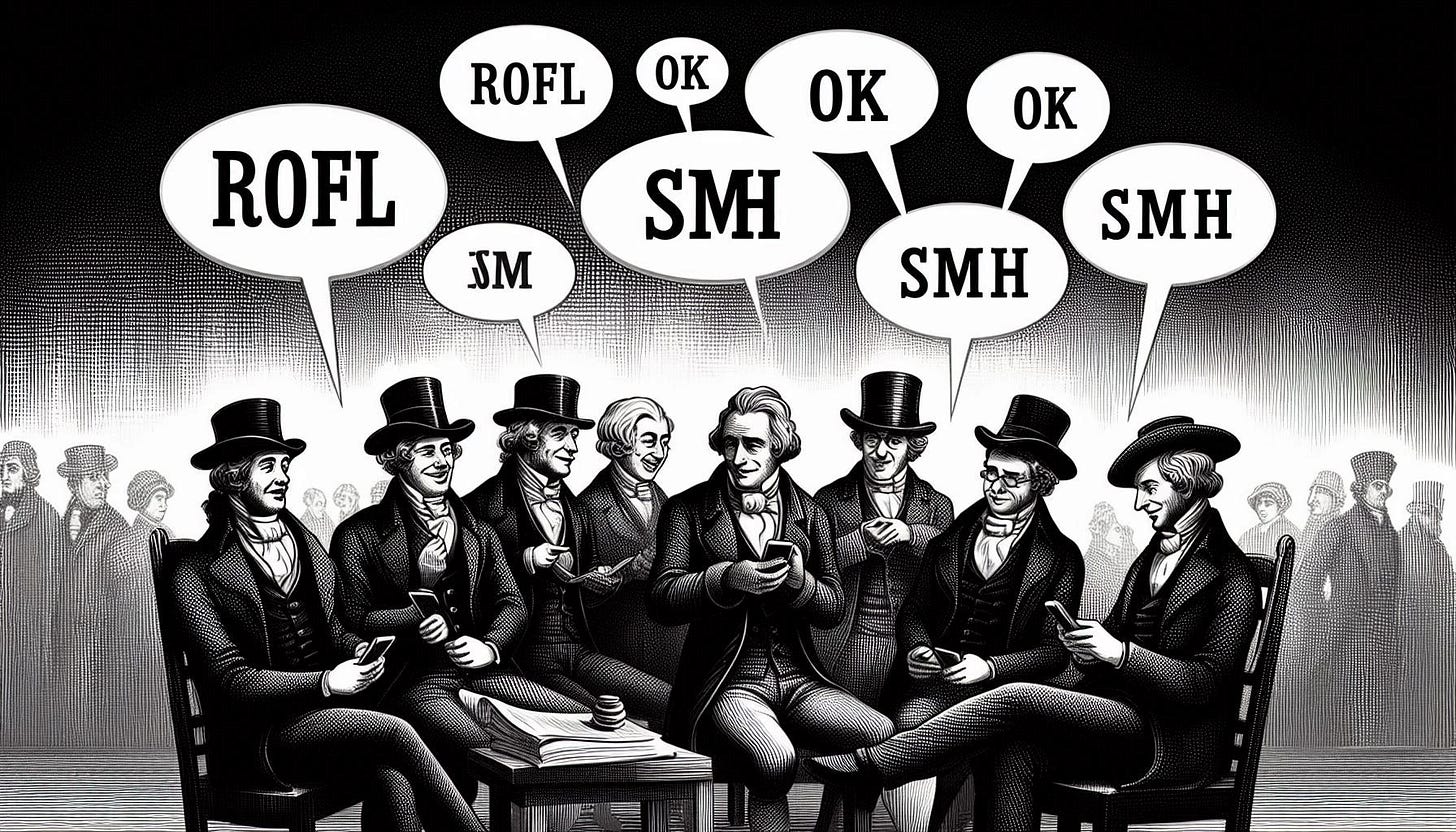Think you're among the first to text-speak your way through life? Think again. The Millennial/GenZ penchant for abbreviations isn't a modern marvel but a linguistic loop stretching back two centuries. Before smartphones and social media, there was the quill and the inkwell. And even back then, people were shortening words for convenience and fun.
If you watch close, history does nothing but repeat itself.
What we call chaos is just patterns we haven't recognized. What we call random is just patterns we can't decipher.
- Chuck Palahniuk (Survivor)
I was fortunate enough to be born at what was not just the turn of the century and millenia, but also a turning point in the advancements in the way we communicate. In short, the mobile phone revolution. From having to wait in line in the public phone booth, or booking trunk for outstation calls to having a device that can instantly connect you to anyone in the world, if both parties wish so, is fantastic.
Drop a person from a hundred years ago into the present, hand them a smartphone, and their mind would probably explode. It’s magic.
Remember Sanjaya from the Mahabharata? He was basically the ancient world's live commentator, keeping Dhritarashtra in the loop about the Kurukshetra war. Today, we've got the internet doing stuff similar, albeit without the divine intervention. It's like a superpower, but less mystical.
Mobiles have come a long way from their bulky beginnings. Back in the day, it was all about voice calls or, for the introverted types like me, the magic of text messaging.
Back in the ‘80s, when tech was still finding its feet, a German engineer named Friedhelm Hillebrand while setting standards for Global Systems for Mobile Communications (GSM), decided 160 characters was plenty for a text. Blame slow connections, limited storage, and the general clunkiness of early mobile networks for this brief message bonanza.
That character limit forced us to get creative with our words. Longer phrases were chopped down into bite-sized abbreviations, and slang like ROFL, LOL, and LMK became the new normal.
You’d think our love affair with abbreviations is a new-age tech quirk, but wind the clock back two centuries, and Boston was already in the thick of its own abbreviation craze. Yep, the 1830s were the OG era of text-speak.
The Boston Abbreviation Fad of the 1830s.
In the 1830s, Boston led a quirky trend with newspapers teeming with witty abbreviations making the city the hub of playful linguistics. People intentionally misspelt words and abbreviated them for comedic effect. Some examples were "OFM" for "our first men," "NG" for "no go," and "GT" for "gone to Texas". Apparently, Texas was a popular place to move to.
The ubiquitous "OK" is a testament to the enduring power of linguistic evolution. Originating as a playful misspelling, its journey from obscure slang to a presidential campaign slogan is a fascinating example of how language can transform.
Letters between the papers’ editors continued to use the abbreviation, but it did not come into widespread usage until the following year, when supporters of President Martin Van Buren, nicknamed “Old Kinderhook” after his hometown in New York, employed “Vote for OK” as a campaign slogan and set up OK Clubs to influence voters. (Voters, as it happened, did not deem Van Buren OK enough for reelection.)
- The Smithsonian Magazine (Source)
From texts to remote controls, it’s sneaked its way into every corner of our lives.
While the motivations behind historical abbreviations like those popular in 1830s Boston might differ from today's digital shorthand, the underlying human desire for efficiency and expression remains constant. What began as a playful linguistic rebellion has evolved into a practical necessity in our fast-paced world. It's a fascinating journey from quirky wordplay to essential communication tools.
From quill to keyboard, humans have been in a perpetual quest to compress language. While the tools may change, our instinct for shortcuts remains constant. As we navigate the digital age, I hope we will ensure that our pursuit of efficiency doesn't inadvertently lead us down a path reminiscent of George Orwell's Newspeak.
History often mirrors the present, reminding us that many of today's trends have roots in the past.





